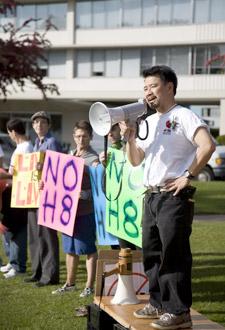
RALLIES ACROSS THE US. Thousands of people took to the streets of San Diego May 26 to protest the California Supreme Court ruling that upheld Proposition 8, the voter-passed constitutional amendment that put a stop to same-sex marriages in California Credit: Rex Wockner photo
Eight hours after California’s Supreme Court upheld Proposition 8, a crowd of about 80 gays and allies gathered at the foot of Davie at Denman St May 26 to show their support for same-sex marriage in California.
The rally, organized by Meg Andronowska, Jim VanDeventer and Roger Chin, followed the court’s 6-1 decision to uphold last November’s citizen-driven ballot measure banning gay marriage in California. Proposition 8 rolled back gay marriage rights granted in June 2008.
Though the court upheld the marriage ban, it also ruled that the 18,000 marriages that took place before Proposition 8 came into effect will remain valid.
In response to last week’s ruling, similar rallies were held across the United States as well as in Toronto which, like Vancouver, is home to a large number of US citizens. Currently, same-sex marriage is legal in three US states — Massachusetts, Iowa and Connecticut — and is expected to be legal in Maine and Vermont later this year.
Paul Holzapfel and Michael Smith, who spoke at the Vancouver rally, are one of the 18,000 gay couples whose Californian nuptials remain valid.
“Michael and I today should feel thankful,” says Holzapfel, who immigrated to Canada with Smith in 2005. “We talked about getting married for a long time. Eight days after we moved here Bill C-38 [legalizing gay marriage in Canada] passed in Parliament. It was an outrageously warm welcome to Canada. It was like ‘gee whiz, we are finally legal under the laws of a country.’”
The couple exchanged vows in 2008 while on vacation in Mendocino, California.
“It was overflowing joy,” says Holzapfel of their wedding day. “It makes me want to cry just thinking of the day when all these couples, some who had been together a year and others for multiple decades got married.”
Although grateful to be married, they are disappointed that other Californians no longer have this right. “It’s just this bizarre group of couples,” says Smith of the 18,000 couples. “It’s sad and tragic. That’s another reason I feel compelled to do this. It puts a moral obligation on me to help make this a right for the people coming after us. We want to bring people into our group.”
Many supporters of same-sex marriage in California hope to repeal Proposition 8 through another ballot initiative in either 2010 or 2012, but Smith and Holzapfel believe the issue must be addressed at the federal level.
They say it’s time to target the federal US legislation which they believe hinders gay rights in the United States, including the Defense of Marriage Act (DOMA), which was signed into law by President Bill Clinton in 1996.
DOMA absolves states of the duty to recognize same-sex marriages from other states and precludes the federal government from recognizing same-sex marriage in any form, even if it is conducted by an individual state.
“With DOMA in place the federal government does not have to recognize same-sex marriages in the states which do recognize it,” says Smith. “If today the courts overruled Proposition 8, it would be meaningless in the eyes of the federal government with DOMA in place.”
With no federal recognition of same-sex marriage, US citizens who wish to sponsor their non-American same-sex partners are unable to do so.
Don Lim and Steven Rowe are one of two bi-national couples who spoke at the rally. Lim, an American, has been in a relationship with Rowe, a British citizen, for more than 12 years.
“Canada was as near as we could get to Don’s family who live in San Francisco and Los Angeles,” says Rowe who would like the option to move to Colorado with his partner. “That’s where we got property, friends and people we consider to be our family. It’s about having the right or opportunity to move back there if we wanted to.”
They rest their hope in the Uniting American Families Act which is currently before a Senate Judiciary Committee. The Act would amend immigration laws to give foreign same-sex partners of American citizens the opportunity to obtain lawful permanent resident status in the United States.
“This is affecting real people,” says Chin. “There are many bi-national couples and American coupes living in exile in Vancouver and things like this do affect them. I have a twin brother who lives in the US, and his partner is afflicted with a terminal illness and this reminds me that marriage affords certain protections in situations such as a medical crisis.”
Many attendees, including Drew Mullins, came out to show their solidarity with those directly affected by the court’s ruling.
“The United States is so close, very similar to our country,” says Mullins. “[Same-sex marriage] is a basic civil right. I would ask anyone who opposes this who is a woman or a person of colour to look back in history and see that there was a point when they didn’t have equal rights.”
Some attendees, including Edith MacHattie and her partner Heather Kelley, feel the border should be of little consequence when it comes to queer rights.
“It really affects me and the whole community when other people don’t share basic human rights,” she says. “Rights can be taken away and governments need to know that people give a shit. Right now same-sex marriage is such a luxury. I live in Vancouver and can marry my partner if I want to, but it shouldn’t be a luxury — it should be a given.”
Kelley worries the ruling could have a ripple effect.
“It’s really worrisome when the rights of a minority are dictated by a majority,” she says. “What happened in California could happen here. There was a law passed that legalized same-sex marriage, but it wasn’t passed by that much and we keep electing not-so-progressive governments.
The rally ended on a hopeful note as Chin publicly expressed gratitude for the rights same-sex couples enjoy here in Canada, not with a speech but a gesture. He scoured the crowd for his boyfriend, Jim VanDeventer, and uttered four words that are for now out of reach to queer Californians.
“Will you marry me?”

 Why you can trust Xtra
Why you can trust Xtra


